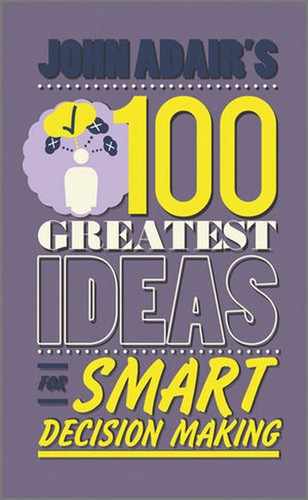Idea 81: Creativity in action – Thomas Edison
A successful man is a friend to failure.
Chinese proverb
Continually called a genius himself, Thomas Edison gave some thought to what the word meant, coming up with the famous definition: ‘Genius is 1 per cent inspiration and 99 per cent perspiration.’ He enlarged on this to his secretary:
Well, about ninety-nine per cent of it is a knowledge of the things that will not work. The other one per cent may be genius, but the only way that I know to accomplish anything is everlastingly to keep working with patient observation.
Even with Edison’s phenomenal work rate, however, it is unlikely that most of us would come up with even one invention of the calibre of the light bulb in the course of a lifetime. He invented not only the light bulb but the phonograph, the telephone (concurrently in competition with Bell), the means of distributing electrical power, X-ray plates and so on until the very end of his life.
The capacity of the man is almost unimaginable. He was able to conceive of machines for recording what we hear, which turned out to be the phonograph, and for recording what we see, which became the moving camera, both of which were outside the realm of anything existing then, so that their conceptualization was a supreme work of imagination.
Confronted with a problem, Edison was able to see how the solution might be arrived at. He could imagine, in the broadest terms, the short and long-term consequences of his inventions. And all that lay between him and these goals was a great deal of hard work, which he could not wait to dispose of as soon as possible.
Edison’s life was ruled by the excitement of the hunt. He once said to a colleague:
I don’t think Nature would be so unkind as to withhold the secret of a good storage battery if a real earnest hunt for it is made. I’m going to hunt.
And hunt he did, whether for the secret of the battery, the right filament for the incandescent bulb, the best mixture for insulating cables, or whatever the current problem might have been in the most methodical and exhaustive manner.
There was never any time to spare; as soon as one problem was solved, another idea was waiting to be put to the test. There was never enough time – and he knew there was not – to investigate all his ideas.
For example, it was not in the end Edison but the Wright brothers who made a successful aeroplane, although as early as 1889 Edison told a journalist:
You can make up your mind … that these fellows who are fooling around with gasbags are wasting their time. The thing can’t be done on those lines. You’ve got to have a machine heavier than air and then find something to lift it with. That’s the trouble, though, to find the ‘something’. I may find it one of these days.
Ask yourself
![]() What are the three key lessons I can learn from Edison’s productive life?
What are the three key lessons I can learn from Edison’s productive life?
